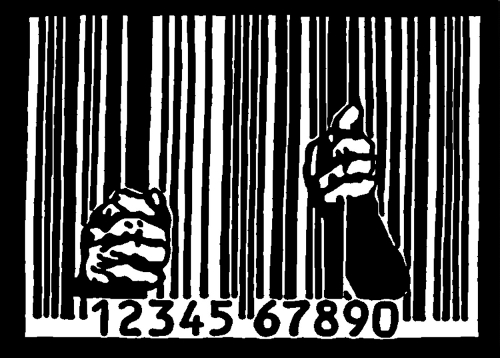To act deliberately in this society; to attempt to live free from coercion and control; to be genuine and authentic to one’s desires; to act truthfully and with honest reflection; all of this means to risk prison. The physical infrastructure of the prison system provides the means to contain those who elude the infinite mechanisms of control that permeate our society; those tools and instruments that attempt to order and restrain the misery, anger, and frustration of civilised life.
 And yet prison is more than the bricks and mortar of physical buildings, the metal of iron bars and cell-doors. It is also a social condition, made manifest each time we submit to the regimentation of work, each time our faces appear on the screens of a security camera, each time we act on fear rather than desire. To struggle against prison is not to struggle against a singular institution; it is to struggle for the dismantling of the entire control apparatus that has spread like a spiked mist into almost (almost) all corners of our society.
And yet prison is more than the bricks and mortar of physical buildings, the metal of iron bars and cell-doors. It is also a social condition, made manifest each time we submit to the regimentation of work, each time our faces appear on the screens of a security camera, each time we act on fear rather than desire. To struggle against prison is not to struggle against a singular institution; it is to struggle for the dismantling of the entire control apparatus that has spread like a spiked mist into almost (almost) all corners of our society.
The experience of prison, of the acute oppression and restriction of freedom, is but a more extreme form of the experience of everyday life in civilised society. We all experience containment; the only variable is the size of the container. Indeed, the management of prison complexes reveals in stark colours the modes of operation of the state and its instruments of oppression. It is here that the spectacle of society outside is stripped bare, and the repressive measures that everywhere prevail are left uncovered and clear. For example, a reflection on prison labour reveals many of the underlying logics of oppression characteristic of society at large. So when the British Justice Secretary explains that the idea of prison labour is to ‘give these guys the idea that work is a normal part of life’ and that if they want to escape the vicious circle of being taken in and out of prison ‘they’d better get used to working’, he reveals how prison forms just one part of an inter-locking web of institutions that work together to oppress us. Thus prison becomes a means by which people are coerced into the system of work (a much more cost-effective form of control for the state).
When one of the expressed aims of prison industries is to ‘ensure dynamic security by providing purposeful activity at relatively low cost’, this is but an expression of the underlying logic of all work, with coerced activity draining any energy that could be used in ways which threaten the dominant system (i.e. which pose a security threat). Similarly, the government’s attempts to re-establish control after the prison rebellions of the 1980s and 1990s by introducing competition for limited jobs and the privileges that come with them merely reflects the wider divide and rule logic of capitalism.
 For those of us who have never set foot in a prison, the thought of doing so is a great source of fear. It is this fear that stops us from doing what we believe needs to be done. It is this fear that eats away at us because it can’t help but make us feel that they’re winning. It is this fear that stretches the gulf between our heads and our hearts. It is this fear that keeps us languishing in nervous hesitation with consequences writ large and blocking out motivations. It is this fear that must be overcome, but weighs us down like an anchor keeping us from just below the surface of the water, stretching to catch a breath. It is this fear that provides the fuel for our prison society, that keeps it functioning.
For those of us who have never set foot in a prison, the thought of doing so is a great source of fear. It is this fear that stops us from doing what we believe needs to be done. It is this fear that eats away at us because it can’t help but make us feel that they’re winning. It is this fear that stretches the gulf between our heads and our hearts. It is this fear that keeps us languishing in nervous hesitation with consequences writ large and blocking out motivations. It is this fear that must be overcome, but weighs us down like an anchor keeping us from just below the surface of the water, stretching to catch a breath. It is this fear that provides the fuel for our prison society, that keeps it functioning.
In order to overcome this fear, we must build secure communities of resistance that place the struggle against prison at their heart. As well as developing a robust security culture, this means building a solidarity network with prisoners to continue the struggle against oppression both inside and outside the walls. Effective resistance will face repression, which means we have to be ready to continue the struggle within the cages they force us into. We must also destroy the illusion of freedom on ‘the outside’ that keeps us so compliant and controlled.
